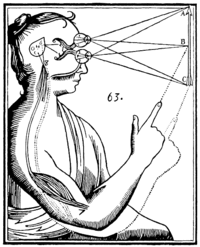
Photo from wikipedia
We compared problem-solving in four sets of classical insight and analytic problems in the verbal and spatial domains, and examined the impact of externalization (verbalization or sketching). In a within-participants… Click to show full abstract
We compared problem-solving in four sets of classical insight and analytic problems in the verbal and spatial domains, and examined the impact of externalization (verbalization or sketching). In a within-participants factorial design, we presented 24 classical insight and analytic problems, half verbal and half spatial. Participants solved these problems either while thinking aloud, while sketching, or in a baseline condition where neither was allowed. Higher solving accuracy was found in the analytic problems than in the insight ones as well as in the verbal problems than in the spatial ones. The verbal problems were also found to be solved faster than were spatial ones; in particular, verbal-insight problems were solved faster than spatial-insight and verbal-analytic ones. Therefore, spatial-insight problems stand out as particularly hard among the ones typically found in the literature. Surprisingly, no effects of externalization were found on problem-solving speed or accuracy. We discuss the implications of our results for the theses that insight problems involve special processes.
Journal Title: PsyCh journal
Year Published: 2022
Link to full text (if available)
Share on Social Media: Sign Up to like & get
recommendations!